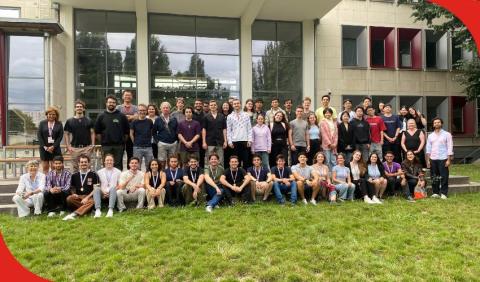World Energy Day: Three EPF Programmes for Training Responsible Engineers !

22 October is World Energy Day—the ideal opportunity for presenting our programmes for engineering professions in the fields of energy, ecological transition and sustainable development, aimed at developing responsible future engineers.
A global day devoted to energy
22 October was first designated as World Energy Day in 2012 through a proclamation by the United Nations following the World Energy Forum.
This global event has two objectives:
- First, to serve as reminder that even in 2020, certain countries in the world have only limited access to energy.
- Second, to raise awareness of the importance of our energy needs and the simple actions we can take every day to conserve energy.
Awareness campaigns serving these purposes are organised throughout France.
Three programmes for developing responsible future engineers in the energy sectors
The issues of energy, ecological transition and sustainable development are very present in our society, and the related professions are growing.
EPF is keenly aware of the need to train future engineers for the energy and sustainable development sectors. It has therefore specifically created three programmes to meet the continuing need for engineers who can respond to current and future environmental issues.
The Energy and Environment Major
The Energy and Environment major at the Montpellier campus aims to train engineers who are committed to addressing the new industrial issues of the sustainability transition. The major will allow general engineering students to specialise in environmental, energy and digital professions. The two-year Energy and Environment major combines work placement opportunities with classes in French and English to provide students with a solid background of technical, scientific and management skills.
A wide variety of professions are open to graduates from this major–research engineer, project manager, consultant–in many different sectors including renewable energy, nuclear energy and industry.
“I was convinced by the broad-based approach of this major. It is highly technical because we draft environmental assessments, develop water and soil models and seek decontamination solutions. But it also includes legal and management issues aspects.” Lara MOUHADJER Energy and Environment major.
More information on the Energy and Environment Major: https://www.epf.fr/formations/cycle-master-les-majeures/majeure-energie-environnement
The Energy Efficiency Bachelor’s Programme
At the Montpellier campus, the Energy Efficiency Bachelor’s programme is a short, 3-year course that allows students to acquire the technical and scientific skills needed for professions in energy consumption optimisation and control.
This comprehensive programme enables students to increase their knowledge through technical courses throughout the training.
EE Bachelor graduates can use their expertise in many different fields, including renewable energies, urban planning and industry, as energy and environment consultants, design office technicians, and assistant engineers in the energy sector.
More information on the Energy Efficiency Bachelor’s Programme: https://www.epf.fr/formations/bachelor-technologique-efficacite-energetique
The Engineering and Sustainable Architecture Major
The Engineering and Sustainable Architecture major offered at the Troyes campus trains responsible engineers capable of designing the buildings and the urban fabric of the future, incorporating environmentally friendly and energy conservation techniques.
Graduates with this major find jobs with large companies in the building and public works sector, energy efficiency and architecture design offices or architecture and urban planning agencies as architectural engineers, technical research officers or project managers.
More information on the Sustainable Architecture Major: https://www.epf.fr/formations/cycle-master-les-majeures/majeure-ingenierie-architecture-durable
A green building for the EPF campus in Troyes
In keeping with its commitment to energy and environmental conservation, the EPF campus in Troyes inaugurated a new green building in March 2014.
The three-storey building with an area of 3,000 m² features innovative architecture and high-quality environmental standards using renewable energy, with the following features:
- Low Energy Building standards
- Ground-coupled heat exchangers
- A photovoltaic roof
- Rainwater harvesting
- Wood frame facade for better thermal insulation
EPF is taking action today to conserve energy for the future.









